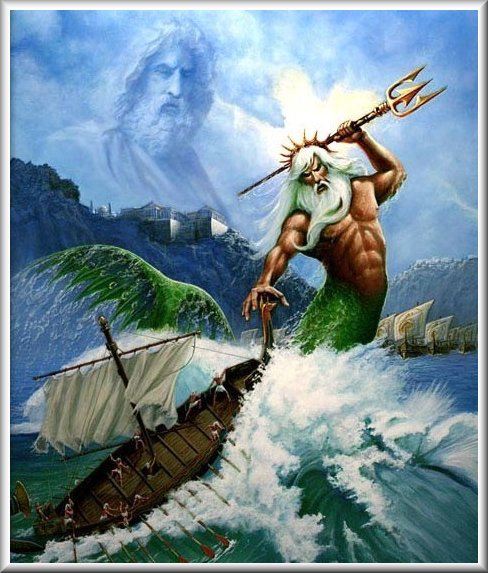

In the earliest poems, Poseidon is described as indeed equal to Zeus in dignity, but weaker. According to others, again, he was brought up by the Telchines at the request of Rhea. 5 According to Tzetzes 6 the nurse of Poseidon bore the name of Arne when Cronus searched after his son, Arne is said to have declared that she knew not where he was, and from her the town of Arne was believed to have received its name.

A well in the neighborhood of Mantineia, where this is said to have happened, was believed, from this circumstance, to have derived the name of the "Lamb's Well," or Arne. 4 According to others, he was concealed by Rhea, after his birth, among a flock of lambs, and his mother pretended to have given birth to a young horse, which she gave to Cronus to devour. Like his brothers and sisters, he was, after his birth, swallowed by his father Cronus, but thrown up again. 2 He was accordingly a brother of Zeus, Hades, Hera, Hestia and Demeter, and it was determined by lot that he should rule over the sea. 1 He was a son of Cronus and Rhea, whence he is called Kronios ( Κρόνιος) and by Latin poets Saturnius. His name seems to be connected with πότος ( potos), πόντος ( pontos), and ποταμός ( potamos), according to which he is the god of the fluid element. Poseidon the Greeks during the Trojan and was cooperative at times although he could also use his powers to punish or revenge people by causing earthquakes, floods and tempests.The god of the Mediterranean sea. Even though Poseidon was the god of horses, Athena built the first chariot and first ship to sail on the sea ruled by Poseidon. To show his anger over the decision Poseidon flooded the Attic Plain but eventually both gods worked in unity by combining their powers. To win the people of the city over, Poseidon threw a spear at the ground and produced the Spring at the Acropolis while Athena gave them an olive tree and won. Poseidon and Athena, the goddess of war, were involved in a competition for the city of Athens. Their procreation resulted in a horse called Arion. Once she turned herself into a mare to avoid him but this resulted in the opposite results when he became a stallion and captured her. Poseidon was in love with his sister Demeter who kept resisting. Other offspring of Poseidon include Eumolpus, the Giant Sinis, Polyphemus, Orion, King Amycus, Proteus, Agenor and Belus from Europa, Pelias and the King of Egypt, Busiris. Another rape involved Amymone when she tried to escape from a satyr and Poseidon saved her. The rape of Aethra by Poseidon resulted in the birth of Theseus and he turned Caeneus into a man, at her request, after raping her. He also impregnated the Gorgon Medusa to conceive Chrysaor and Pegasus, the flying horse. With Amphitrite he produced Triton who was half-human and half-fish. He once married a Nereid, Amphitrite, for whom he created the islands called Paxi by hitting his trident on the southernmost part of Corfu. Poseidon had many similarities to Zeus regarding his love affairs and he also had numerous partners and many children. In contrast, when he was in a bad mood, Poseidon would strike the ground with a trident and cause unruly springs and earthquakes, ship wrecks and drownings. When he was in a good mood, Poseidon created new lands in the water and a calm sea. However, Poseidon was a very moody divinity and his temperament could sometimes result in violence. He lived on the ocean floor in a palace made of coral and gems and drove a chariot pulled by horses. Many men drowned horses in sacrifice of his honor. Poseidon was relied upon by sailors for a safe voyage on the sea. The symbols associated with Poseidon include: dolphins, tridents and three-pronged fish spears. Poseidon became the ruler of the sea, Zeus ruled the sky and Hades the underworld. Along with Zeus and Hades they have decided the world in three parts. In Greek mythology, Poseidon is the god of sea, horses and earthquakes and the brother of Hestia, Demeter, Hera, Hades, and Zeus.


 0 kommentar(er)
0 kommentar(er)
